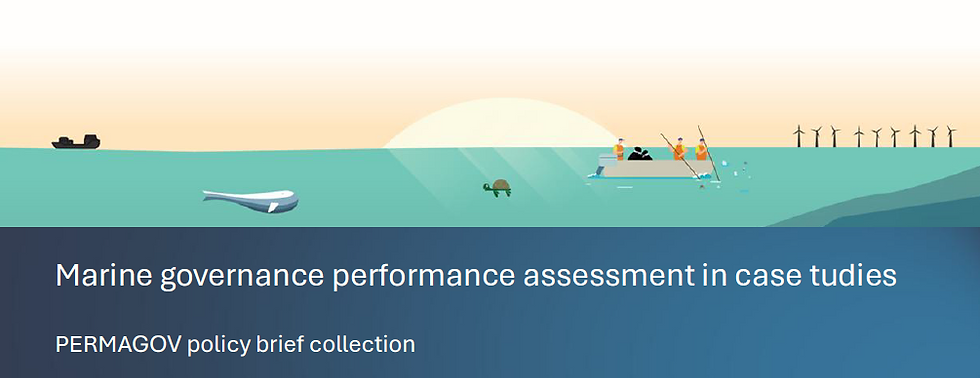Diagnosing Institutional Barriers in Marine Plastic Governance: Lessons from the Baltic and Mediterranean SEA Cases
- pavel874
- Jul 15, 2025
- 4 min read
Institutional barriers are deeply rooted in governance structures and institutional design, hindering effective marine plastics policy implementation. The PERMAGOV diagnostic tool helps to link specific institutional barriers to institutional design attributes. Case studies in the Baltic and Mediterranean Seas illustrate practical challenges and potential solutions to overcoming institutional barriers, such as data transparency, stakeholder collaboration, legal reform, and economic incentives.

Institutional barriers
Institutional barriers are “impasses in governance processes that are rooted in the institutional context of the adaptation situation” (Oberlack 2017: 807). Institutional barriers are symptoms of deeper governance issues. They hinder the achievement of policy targets, so their root causes must be identified and understood to increase governance performance.
Types of institutional barriers
Actor eligibility: Lack of (appropriate) boundary rules that regulate the set of eligible actors in action situations. This can lead to a lack of clarity about actor eligibility, actor exclusion, or over inclusion of non-key actors.
Actor roles and responsibilities: Inappropriate rules that regulate the positions available to participants and the set of required, prohibited and allowed actions assigned to positions. This can lead to a lack of clarity about actor roles, limits on actor capacity, and actors taking roles for which they are not authorised.
Actor control (power distribution): Lack of appropriate rules that establish the kind of control actors have over outcomes of action situations. This can cause inappropriate control by powerful actors, inability to influence institutions by weak actors, weak provisions for leadership, and unclear distribution of responsibilities.
Actor accountability: Inappropriate institutional provisions for monitoring, evaluating, rewarding, and enforcing responsibilities. This can lead to a lack of clarity in decision making processes, absence of feedback mechanisms, and ineffective compliance and enforcement mechanism.
Actor connectivity: Inappropriate structures that connect actors within and across multiple tiers of social organisation. This can result in poorly networked actors within and/or across tiers of social organisation.
Conflict mechanisms: Lack of appropriate institutional provisions for regulating, preventing or resolving conflicting values, preferences and actions among actors. This can cause conflicts among actors, disputes over rules in use, and lacking or ineffective dispute settlement mechanisms.
Development and use of knowledge: Inappropriate institutional attributes that shape how information, knowledge claims and values are constructed, communicated, accepted, and used. This can cause weak processes for reflexivity and institutional learning inappropriate science-policy interfaces, too many or too diverse data providers, and data fragmentation e.g. lack of coordination and processes to harmonise and ensure interoperability of data.
Scale of institutions: Inappropriate spatial and temporal implications of institutions. This can cause a mismatch between temporal and/or spatial scale of issue and institution, disintegration or lack of coordination among different institutions or levels of governance, leading to inefficiencies and gaps (fragmentation), and insufficient division of institutions into manageable problem areas, leading to inefficiencies.
Rigidity of institutions: Change in the rules-in-use is inappropriately constrained by higher-order rules, transaction costs and path dependence. This can lead to the 'stickiness' of institutions, path dependence, and institutional drift.
Formality of institutions: Inappropriate degree to which rules-in-use are embedded in written laws, plans, documents. This can cause over- or under-formalised institutions.
Institutionalised incentives: Inappropriate provision for institutionalised incentives for actors. This can cause a lack of incentives for actors to engage in governance processes, misalignment between incentives and objectives, over-ambitious policy goals, poorly specified objectives.
The diagnostic tool
PERMAGOV developed a diagnostic tool based on a literature review and insights from end-users and selected stakeholders. The tool helps to identify and analyse institutional barriers and design attributes within marine governance issues. It enables researchers to connect specific barriers with the institutional design attributes that cause them. In this article, we summarise preliminary findings from the application of the diagnostic tool in two case studies focused on plastic pollution in the Baltic and Mediterranean seas.
Institutional barriers in the Mediterranean Sea region: Agri-Plastics in the Mar Menor
Institutionalised incentives: A lack of innovative business practices to prevent plastic waste generation in line with the Extended Producer Responsibility approach.
Actor connectivity: Need to increase awareness raising for all citizens as well as industry-targeted trainings to reduce plastic consumption and emission.
Rigidity of institutions: Need to revise the current legal framework at the national levels e.g. National Action Plans and/or Programmes of Measures.
Development and use of knowledge: Need to develop a database on the production and consumption of plastic products.
Institutional barriers in the Baltic Sea region: Abandoned, Lost and otherwise Discarded Fishing Gear (ALDFG)
Actor connectivity: Insufficient communication across sectors inhibits a common framing of the problem and promoting distrust between actors.
Actor connectivity: Cross-policy (i.e. between ministries) coordination is largely absent, reducing actor engagement and policy effectiveness.
Rigidity of institutions: Implementation of recently adopted policies is still in progress in several sectors, increasing the operational uncertainty for multiple industries and reducing policy effectiveness.
Institutionalised incentives: Inconsistent funding limits long-term planning and policy effectiveness.
Development and use of knowledge: Insufficient data and mechanisms to share and leverage information limits stakeholder understanding of the seriousness and scope of the issue as well as impedes the ability of decision-makers to design targeted actions.












Comments